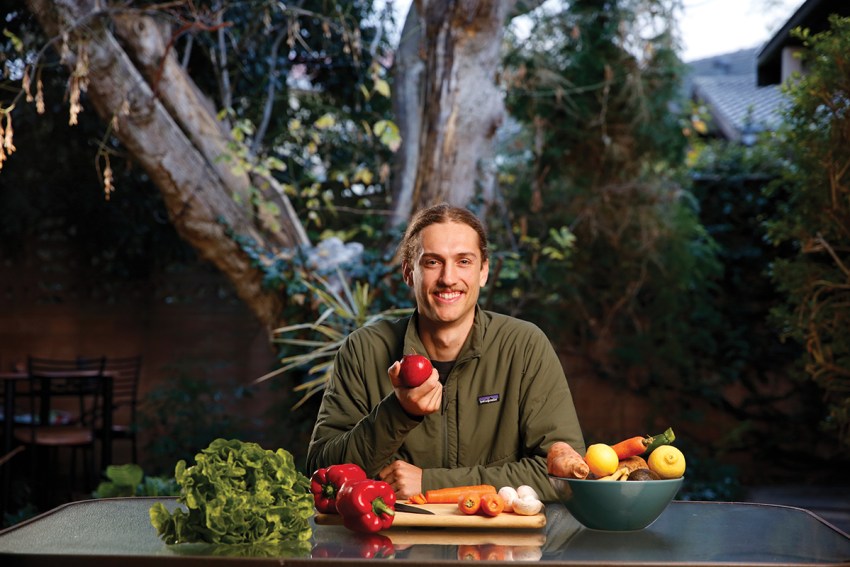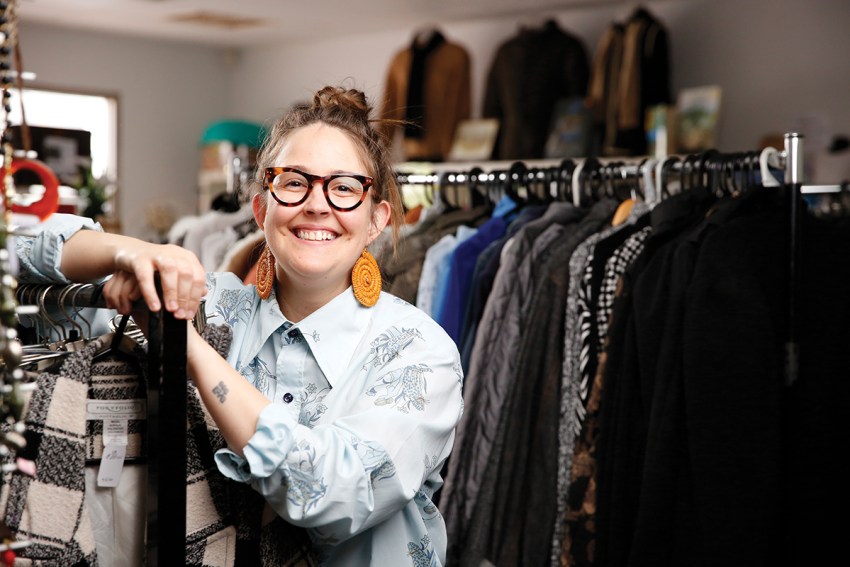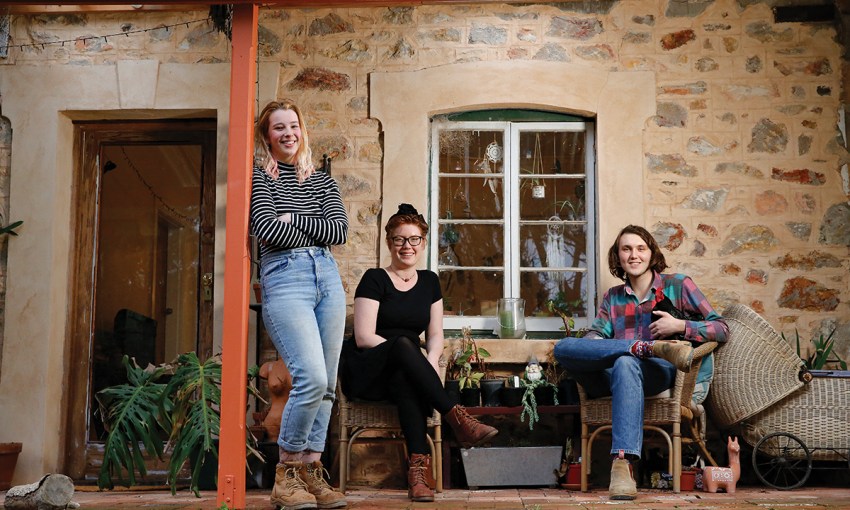With Australia’s per-capita CO2 emissions among the world’s highest, more and more young people are taking responsibility for their own environmental footprint while inspiring others to do the same.
Life on earth: Reducing your footprint
An eco-friendly household
There’s a perception that running an environmentally-friendly household might be expensive, but as this happy share house at Cherry Gardens proves, sustainability goes hand-in-hand with thriftiness. Ayisha Pauli and couple Yolanda Tree and Will Armfield have fine-tuned their many efforts to lower their combined environmental impact, while maintaining a very low household budget along the way.
“Many of our friends are considering moving out at the moment and they think that eco-friendliness is really expensive when actually it’s really cheap,” says Yolanda.
“It is actually very achievable for a low-budget household to be environmentally friendly.”
Almost all of their household items are second-hand, including clothes, appliances and furniture such as their dining room chairs, which they found on the side of the road, fixed up and painted. Their extensive recycling system is so remarkably well-organised that none of their household waste goes to landfill.
The trio shop at the Adelaide Central Market to buy produce that isn’t plastic-wrapped and have happily discovered markets to be cheaper than supermarkets. Growing their own veggies and harvesting eggs from their chooks and ducks goes a long way, too. “Markets are a great way to cut your food bill and also reduce plastic waste,” says Ayisha.
Ayisha switched her superannuation to an ethical fund that doesn’t invest in fossil fuel industries and her housemates have followed suit. “We’re all in an ethical Australian super fund which funnily enough has a better return than the major funds, when you’d think it would be the other way around. It’s easy to do and only took us about 10 minutes,” she says.
They consume a vegan diet, except for home-laid eggs, while vegetable scraps are composted, made into stock or fed to their pets. “In terms of our carbon footprint, it’s mostly transport that we struggle with because there is no public transport where we live, tucked away in the Hills, so we do have to use our cars,” says Yolanda.
Using responsibly-sourced timber, they heat their home with a pot-belly stove on which they’ll often place a pot of water to cook food or use to wash dishes. The home is fed by rainwater tanks and electricity is supplied by a solar power system installed by their landlord.
Such is their passion for the cause, the three have together attended Climate Strike protests and Ayisha says it’s a bonus to have all housemates on the same page in relation to their environmental impact. “We’ve all come from families who respect the environment and we’ve been raised to do what we can to protect and preserve our natural world.”

Eat your vegetables
For Wattle Park’s Nic Hillbery, embracing a vegetarian diet was a gradual shift that came about after travelling parts of the world where it wasn’t safe to eat locally-prepared meat. “When I started reducing my consumption, it made me realise that I didn’t need to eat as much meat. When I came back from my travels, I made the decision to become vegetarian and stuck with it. Since then, I’ve been educating myself about the environmental impacts of how you live your life and what products you buy,” says Nic.
It seems that nowadays more young people like Nic are taking up a plant-based lifestyle because of their concerns for planet earth. With the global population at 7.8 billion people, double what it was in 1961, more than half of the planet’s habitable land is used for agriculture with the lion’s share taken up by livestock grazing and feed production. The livestock sector produces 14.5 per cent of total greenhouse emissions with the cattle industry being the largest contributor.
“The earlier we start going in the right direction the better it’s going to be; we can still save this planet. On a smaller scale, you might think ‘what difference does one person make?’ but the whole world is made up of individuals,” says Nic.
The 26-year-old adopted a completely vegetarian diet in 2018 and although he says it might not be for everyone, any reduction in meat consumption is beneficial. “It starts with small stuff. Some people might find it difficult to suddenly become vegan – it could be draining to have to make such a big change in your life overnight. You could start by having one vegetarian day a week. I think we definitely can make a difference. We’re getting to a crisis point, so starting now is the best time to make a change,” he says.
It was also while travelling that Nic became wary of the environmental impact caused by air travel. “Exploring the world is one of the most amazing things, but it does make you think about your environmental impact, which has definitely slowed me down in regards to travel,” he says.
Nic is encouraged by the fact that his employer Operation Flinders has its own Environmental Management Committee that embraces sustainable practices such as waste management. “Whenever I’m in the outdoors, I make sure I leave the environment the way it was before I was there. We adopt a ‘leave no trace’ principle with every outdoor activity we undertake at Operation Flinders and it’s a core part of minimising our environmental impact,” he says.
“You can start with small things and build that momentum. If you start making a change, people around you will see that and they’ll slowly start going in that direction, too. It also makes you feel better about your impact on the world.”

Style savvy
Erin Davidson often garners kudos for her quirky sense of style. “Compliments for the crazy things I wear? Yeah, I do,” Erin laughs. “I do feel I’m different in that sense. Being more confident with what I project to the world is something that has come with age. I bought these earrings at the Darwin Aboriginal Art Fair, but they’re not good in high wind.”
Erin, who works as a project officer at the Art Gallery of South Australia, wears almost entirely second-hand clothes and has to think hard to remember the last time she purchased something brand new. “It would have been in 2019 when I was involved in a function and bought myself a new dress, which was very unusual. My shopping habits are very minimalistic.”
Her love of second-hand clothing was sparked by her grandpa Henry who would drive down from Sydney to visit her family in Victoria, picking her up to go op-shopping around Bendigo. “He was known for these crazy, wild shirts and he would find amazing clothes that made him the life of the party. You’d see him pick up the odd thing and you’d think: ‘Where on earth did he get that from and why did he pick it?’”
“When we found pieces, he would often speculate on what life it might have had before. He would also pick up second-hand clothes as mementos on his travels. That’s stuck with me and when I do travel, rather than picking up a souvenir or a postcard, I’ll go to an op shop or an art centre; that’s where I’d rather put my money.”
In more recent years, Erin’s shopping habits have aligned with her concern for the environment. “For me, recycling clothing has been ingrained from a young age and since then I’ve realised how important it is. I’ve become aware of how things are made and the mass-produced nature of fashion. I’m really worried about how it all ends up in landfill,” she says.
Erin is diligent with her recycling, catches public transport and is currently looking into buying an electric bicycle, all of it inspired through conversations with like-minded friends and family. She is also buoyed by younger generations and their awareness of sustainability.
“I’m pleased to see that different generations of people are aware of it. I work with women who are into fashion and they are swapping, reselling and moving things around second-hand, which is really lovely to see.”
And while re-using clothing is good for the environment, Erin says op-shopping is also a rewarding experience. “The volunteers are so passionate about their displays and you’ll often notice a theme of colours or styles. If you chat with them, they’ll be excited to show you different things. That’s the beauty of little op shops such as Puddle Jumpers, they have such a lovely community feel.”
This story first appeared in the August 2021 issue of SALIFE magazine.



